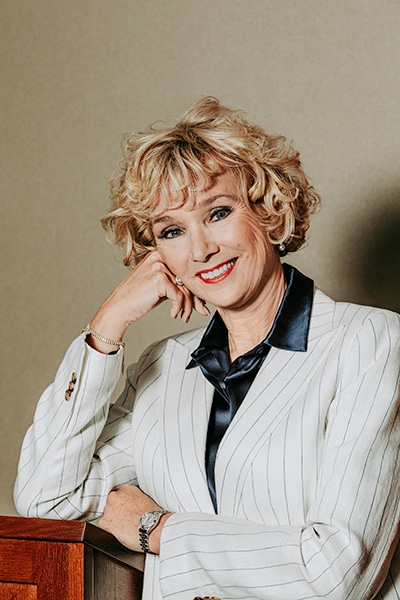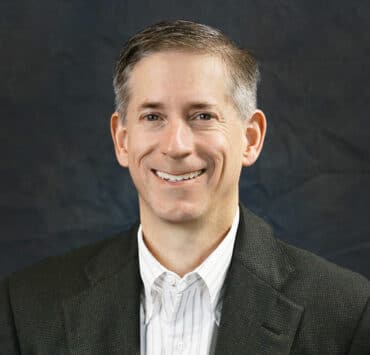When it comes to landing her current role at Edward-Elmhurst Health (EEH), Denise Chamberlain describes herself as Goldilocks. “I’ve been in bigger places, I’ve been in smaller places—but this, this is home,” she says.
Edward-Elmhurst, ranked as one of the top healthcare organizations in the country by Watson, is where Chamberlain is now the chief financial officer. Her journey there, however, was not always a smooth one. Chamberlain describes her career path to her current state of success as bumpy, beginning with the pursuit of her undergraduate degree. “I was just clueless,” she says.
She dropped out of college after her sophomore year and found herself working as a secretary for a family-owned company, where she grew curious about their financial situation. “I got curious about whether or not my division was making money because nobody told me that. As secretary, I did all the billing and knew what we spent,” she says, “so I literally started tracking it and putting it together.” The owner, after discovering this, took a great interest in Chamberlain and her overall drive and encouraged her to go back to school.
Seven years removed from any formal education and with a family of her own, Chamberlain not only went back to school but graduated with honors and obtained her first job in healthcare at Arthur Andersen in Dallas. She worked her way up the ladder with CFO jobs at small to midsize businesses in the Southwest, then moved to Vanguard Health Systems in Phoenix to fulfill a role that she considers to be the true catapult for the rest of her career.

It was there that Chamberlain quickly discovered not just her passion, but the eureka moment behind so much of what she has built and is currently building at Edward-Elmhurst Health. Vanguard was a for-profit healthcare chain (subsequently sold to Tenet), which was an entirely new sector of healthcare for Chamberlain.
“At a for-profit chain, the CFO’s job really is financial operations,” she says. “Most things I do now [at EEH] was done for me there. I really had one job: put together a budget and deliver it.”
But Chamberlain soon discovered that to properly construct the budget, she needed to go directly into the hospital and understand what drove the results she reported on. She quickly understood there was a disconnect. “The level zero I knew about operations matched the level zero of what they knew about finance,” Chamberlain says, laughing. “Neither one of us knew anything about each other.”
The hospital was losing money, and Chamberlain was brought in to turn things around. So she promptly began focusing on fostering the relationship between finance and operations, encouraging them to teach one another and work together—and to be a united front. The hospital went from losing money to having a 10 percent margin in her first three years there, which catapulted the idea for her book, Money to Care: Hospital Finance for Nonfinancial Hospital Leaders.
It was in recognizing the need for nonfinancial people to understand finance that she found her second calling: teaching. Chamberlain now has her masters’ degree in adult education and training and teaches classes to healthcare professionals as much as she can.
After Vanguard, her path led her to Illinois in a sort of happy accident. At the time, she was working for an interim company with CFO placement and was temporarily assigned to Edward-Elmhurst Health. Originally, she was solely interested in the role because she had family nearby, and this role gave her the chance to be close to them. After being there for just one month, she fell in love. She was ultimately asked to transition to the permanent role of CFO.
At EEH, Chamberlain has implemented staunchly successful operating improvement initiatives—especially when it came to bridging the gap between finance and operations. When she arrived, there was essentially no infrastructure for this connection, so she emphasized the importance of baking initiatives into the budget.
“For me it’s not about focusing on the money. It’s about doing the right thing and the money will come. And I get the opportunity to live that personal mission in terms of how I view healthcare and how we work together.”
So far, she has assisted in developing teams, sending monthly reports to leadership, and being the voice for finance at enterprise-wide town halls. She is also part of monthly operation reviews in which all departments meet to discuss their finances, and all department heads are very integrated in their budget, she says.
“It’s not just that the finance department does it all and pushes it out,” Chamberlain notes. “We have really upped the game here of connecting finance and operations. It’s very transparent.” According to Chamberlain, the whole enterprise now helps with what she calls “the hill, the hole, and the dirt.”
“The hill is that you always want to get better. The hole is inflation, new spend, all the things that will take away from our performance compared to last year. I have to somehow get from the bottom of the hole up to the top of the hill—and that’s with dirt. The whole enterprise is involved in identifying how big the hole is and where we are going to get the dirt,” Chamberlain explains.
“Denise’s vision and leadership has made working with Edward-Elmhurst over the past year a truly unforgettable experience,” says John Talaga, executive vice president of healthcare at Flywire and close partner of Chamberlain’s. “Her laser focus on creating a better financial experience for her patients has led to a dramatic transformation in the types of consumer-friendly solutions they offer and the ways that they engage patients across their healthcare journey.”
Chamberlain is also responsible for moving forward with Edward-Elmurst’s Enterprise Resource Planning (ERP) software as it transitions to the cloud, which began before the COVID-19 pandemic. The health system was about to finish onsite demos with vendors when the pandemic shut processes down.

“All nonurgent capital was put on pause,” says Chamberlain, “but I made the decision that we needed to keep moving forward with this ERP selection. Everyone else in the country was basically in the same place we were, to move to the cloud . . . and so I thought that we would get a bit of an edge by continuing this process while many others went on pause.”
After ultimately deciding on using Workday to help with the process, EEH is now in its eighteen-month journey of fully implementing this new system. As for the rest of its experience with COVID-19, Edward-Elmhurst was fortunate, says Chamberlain, due to meticulous and thoughtful finance management.
“We were blessed to have a year’s cash on hand,” she says. “There wasn’t a panic from a financial standpoint as our volumes plummeted and elective services stopped. From a cash flow perspective, we were still fine.”
Chamberlain emphasizes that the organization’s strong commitment to its community was a crucial aspect to maintaining as much normalcy as possible. EEH met with employees weekly to reassure them that their jobs were not in jeopardy. In fact, the company didn’t lay off any employee during even the most tumultuous times.
“As with many health systems, we are close to the largest employer in town. We felt it was important to keep people working,” she says. While a lot of calculated moves were behind their steadiness during the pandemic, every move they made in terms of financial stability was made with the priority being that EEH protects its people first—a commitment that’s also shown in its mantra: safe, seamless, and personal.
“Everything we do comes back to, ‘Is it contributing to being safe, seamless, and personal for our patients?’” Chamberlain says. “One of the things that makes us unusual is that our system CEO and our CEO/president of one hospital are both nurses. And consequently, everything starts with the patient and the nursing teams and support teams that are taking care of those patients.
“That’s part of the reason I love being a CFO here,” she adds. “For me, it’s not about focusing on the money. It’s about doing the right thing, and the money will come. And I get the opportunity to live that personal mission in terms of how I view healthcare and how we work together.”
Impact Advisors is a nationally recognized healthcare management consulting firm delivering innovation and value through strategic advisory, technology implementation, and operational improvement services. We are committed to partnering with Edward-Elmhurst to bring the best talent, capacity, and expertise to solve evolving business challenges and help advance the healthcare industry.


